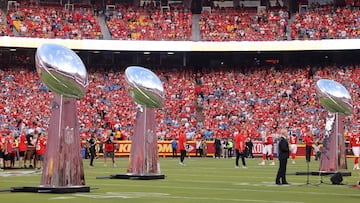How do NFL players get paid? Per game or per week?
NFL players’ salaries are a byzantine mix of different schemes, signing bonus, base salary and bounties. Every bump in the road can change their pay.

The NFL works on a system of pay caps for each team which affects how general managers pick and choose who stays on the roster and who gets cut. Players’ contracts have different clauses that GMs can use to entice players to their teams, or use to cut a player to get under the salary cap. These can affect the players’ pay during the year.
The NFL and NFL Players Association have agreed to set a minimum salary cap number for 2023 at $224.8 million for each of the 32 teams. This is $16.6 million more than last year’s cap of $208.2 million.
NFL players don’t get paid as if they work a nine-to-five job, which they clearly don’t. They earn a weekly salary but only during the season with conditions set on whether they play and how they perform. Like other workers they get bonuses that are paid outside the regular schedule of payments. In order to understand how NFL players get paid, a look at different parts of their contracts is needed.
READ ALSO:
Base Salary
Every NFL player who is on a team’s roster during the year will earn a base salary divided up into 18 installments. That covers the 17-game schedule and the bye week which make up the season. If a player gets cut during the season, the bulk of the money they expected to earn gets lost unless they have a guarantee.
Guarantees
Base salary can be non-guaranteed or guaranteed depending on various clauses and conditions. There are three types of guaranteed money that teams can use when drawing up a contract: injury, skill and cap.
Injury guarantee
This is the best-known form of guaranteed money, which is activated when a player is cut from the team but is unable to play ball or pass a physical. The player is entitled to the money in his contract that is protected against injury.
Skill guarantees and cap guarantees
These two guarantees usually go hand in hand. A skill guarantee protects a player from being cut in the event the team feels the player’s skills don’t meet the team’s needs. A cap guarantee protects the player from being released so that the team can get cap space to sign a free agent, or re-sign another player.
Full guarantee
Combining all three: injury, skill and cap guarantees, forms a full guarantee. Full guarantees are used in almost every NFL contract and the player is entitled the money from full guarantees when they sign the contract.
Signing bonus
Players receive a signing bonus upon signing their contract with a team and it is fully guaranteed. The player usually receives payment in the first year after signing with a team. The team can pay the player the whole amount at once or spread the payments out over the length of the contract to reserve cap space. This is known as a “pro-rated bonus” and a team can spread the payment out over a maximum of five years. However if the team cuts the player it must pay the full amount outstanding, reducing their cap space.
Roster bonus
This bonus is paid out to a player for being on the roster at a certain date or being on the active roster during the year.
The most common form is to specify that the player will be on the roster on a certain date. This protects the player from being released before that specific date, unless the team is willing to pay out.
The other form is paid out to the player if they are on the active roster as opposed to the 53-man roster, also known as a “per-game roster”. The player is paid 1/16th of the bonus for each week they are on the active roster.
Workout bonus
This is money agreed upon for attending a stipulated percentage of offseason workouts paid at a flat rate. Players with four or more cumulative seasons get five guaranteed absences without being penalized.
Options bonus
This is like a signing bonus but is activated at a later date; it is guaranteed money later in a player’s contract. This bonus can be pro-rated over the length of the contract for up to five years.
Incentives
Teams also pay players incentives to hit certain goals set in the contract like passing or receiving yards. These incentives come in two forms: Likely To Be Earned (LTBE) and Not Likely To Be Earned (NLTBE). These incentives are based on what the player did in the previous season.
For example, if a player received the incentive for say rushing 1,000 yards and he has the same threshold in the upcoming season it is considered LTBE. This would count toward the team’s cap in the season it was set. Whereas NLTBE incentives count against the next season’s cap.





